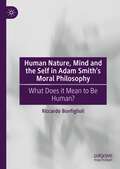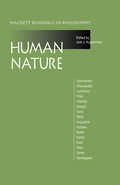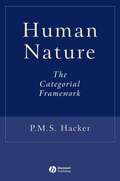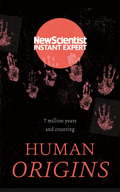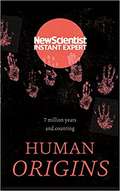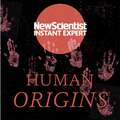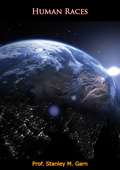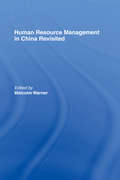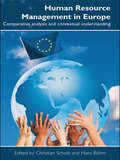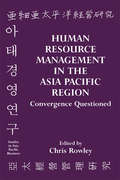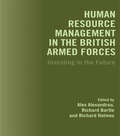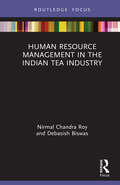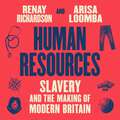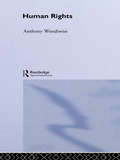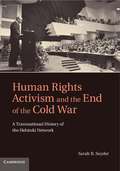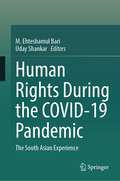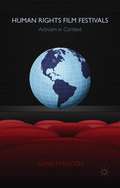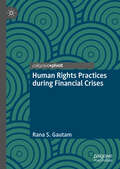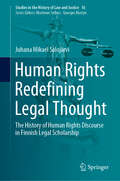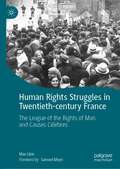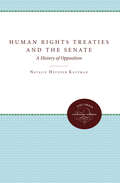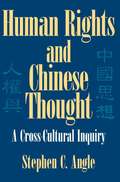- Table View
- List View
Human Nature, Mind and the Self in Adam Smith's Moral Philosophy: What Does it Mean to Be Human?
by Riccardo BonfiglioliThis book investigates the problematisation in Adam Smith's moral philosophy of a classical question: what makes us human beings from a moral standpoint? To do this, Riccardo Bonfiglioli explores the relationship between the concepts of ‘human nature’, ‘mind’ and ‘the self’ in order to reconstruct Smith’s theory of subjectivity. After providing a systematic reconstruction of Adam Smith’s conceptions of ‘human nature’ , ‘mind’ and ‘the self’ – exploring some aspects of Smith’s philosophy (nature, philosophy of history, sympathy and imagination) and their empirical expressions (education, conduct and character) – Bonfiglioli argues that, in Adam Smith’s work, the meaning of ‘moral human beings’ would depend on the human being’s effort to live in harmony with oneself and the others. According to Bonfiglioli, in Smith’s moral theory, this ‘harmony with oneself and the others’ would be achieved in relation to a certain kind of awareness that can be possible when human beings try to judge the conduct and try to act according to the impartial spectator. Specifically, this impartial spectator is reinterpreted by the author in the light of the concept of immediacy.
Human Nature: A Reader
by Joel J. KuppermanThis anthology provides a set of distinctive, influential views that explore the mysteries of human nature from a variety of perspectives. It can be read on its own, or in conjunction with Joel Kupperman's text, Theories of Human Nature.
Human Nature: The Categorial Framework
by P. M. HackerThis major new study by one of the most penetrating and persistent critics of philosophical and scientific orthodoxy, returns to Aristotle in order to examine the salient categories in terms of which we think about ourselves and our nature, and the distinctive forms of explanation we invoke to render ourselves intelligible to ourselves. The culmination of 40 years of thought on the philosophy of mind and the nature of the mankind Written by one of the world’s leading philosophers, the co-author of the monumental 4 volume Analytical Commentary on the Philosophical Investigations (Blackwell Publishing, 1980-2004) Uses broad categories, such as substance, causation, agency and power to examine how we think about ourselves and our nature Platonic and Aristotelian conceptions of human nature are sketched and contrasted Individual chapters clarify and provide an historical overview of a specific concept, then link the concept to ideas contained in other chapters
Human Origins: 7 million years and counting (Instant Expert Ser.)
by New ScientistWhere did we come from? Where are we going?Homo sapiens is the most successful, the most widespread and the most influential species ever to walk the Earth. In the blink of an evolutionary eye we have spread around the globe, taken control of Earth's biological and mineral resources, transformed the environment, discovered the secrets of the universe and travelled into space.Yet just 7 million years ago, we were just another species of great ape making a quiet living in the forests of East Africa. We do not know exactly what this ancestor was like, but it was no more likely than a chimpanzee or gorilla to sail across the ocean, write a symphony, invent a steam engine or ponder the meaning of existence. How did we get from there to here?Human Origins recounts the most astonishing evolutionary tale ever told. Discover how our ancestors made the first tentative steps towards becoming human, how we lost our fur but gained language, fire and tools, how we strode out of Africa, invented farming and cities and ultimately created modern civilisation - perhaps the only one of its kind in the universe. Meet your long-lost ancestors, the other humans who once shared the planet with us, and learn where the story might end. ABOUT THE SERIESNew Scientist Instant Expert books are definitive and accessible entry points to the most important subjects in science; subjects that challenge, attract debate, invite controversy and engage the most enquiring minds. Designed for curious readers who want to know how things work and why, the Instant Expert series explores the topics that really matter and their impact on individuals, society, and the planet, translating the scientific complexities around us into language that's open to everyone, and putting new ideas and discoveries into perspective and context.
Human Origins: 7 million years and counting (Instant Expert)
by New ScientistWhere did we come from? Where are we going?Homo sapiens is the most successful, the most widespread and the most influential species ever to walk the Earth. In the blink of an evolutionary eye we have spread around the globe, taken control of Earth's biological and mineral resources, transformed the environment, discovered the secrets of the universe and travelled into space.Yet just 7 million years ago, we were just another species of great ape making a quiet living in the forests of East Africa. We do not know exactly what this ancestor was like, but it was no more likely than a chimpanzee or gorilla to sail across the ocean, write a symphony, invent a steam engine or ponder the meaning of existence. How did we get from there to here?The Story of Human Origins recounts the most astonishing evolutionary tale ever told.Discover how our ancestors made the first tentative steps towards becoming human, how we lost our fur but gained language, fire and tools, how we strode out of Africa, invented farming and cities and ultimately created modern civilization - perhaps the only one of its kind in the Universe. Meet your long-lost ancestors, the other humans who once shared the planet with us, and learn where the story might end.
Human Origins: 7 million years and counting (New Scientist Instant Expert)
by New ScientistWhere did we come from? Where are we going?Homo sapiens is the most successful, the most widespread and the most influential species ever to walk the Earth. In the blink of an evolutionary eye we have spread around the globe, taken control of Earth's biological and mineral resources, transformed the environment, discovered the secrets of the universe and travelled into space.Yet just 7 million years ago, we were just another species of great ape making a quiet living in the forests of East Africa. We do not know exactly what this ancestor was like, but it was no more likely than a chimpanzee or gorilla to sail across the ocean, write a symphony, invent a steam engine or ponder the meaning of existence. How did we get from there to here?Human Origins recounts the most astonishing evolutionary tale ever told. Discover how our ancestors made the first tentative steps towards becoming human, how we lost our fur but gained language, fire and tools, how we strode out of Africa, invented farming and cities and ultimately created modern civilisation - perhaps the only one of its kind in the universe. Meet your long-lost ancestors, the other humans who once shared the planet with us, and learn where the story might end. ABOUT THE SERIESNew Scientist Instant Expert books are definitive and accessible entry points to the most important subjects in science; subjects that challenge, attract debate, invite controversy and engage the most enquiring minds. Designed for curious readers who want to know how things work and why, the Instant Expert series explores the topics that really matter and their impact on individuals, society, and the planet, translating the scientific complexities around us into language that's open to everyone, and putting new ideas and discoveries into perspective and context.
Human Origins: 7 million years and counting (New Scientist Instant Expert)
by New ScientistThe story of how our ancestors made the first tentative steps towards becoming human, how we lost our fur but gained language, fire and tools, and how we strode out of Africa, invented farming and cities and ultimately created modern civilisation.Where did we come from? Where are we going?Homo sapiens is the most successful, the most widespread and the most influential species ever to walk the Earth. In the blink of an evolutionary eye we have spread around the globe, taken control of Earth's biological and mineral resources, transformed the environment, discovered the secrets of the universe and travelled into space.Yet just 7 million years ago, we were just another species of great ape making a quiet living in the forests of East Africa. We do not know exactly what this ancestor was like, but it was no more likely than a chimpanzee or gorilla to sail across the ocean, write a symphony, invent a steam engine or ponder the meaning of existence. How did we get from there to here?Human Origins recounts the most astonishing evolutionary tale ever told. Discover how our ancestors made the first tentative steps towards becoming human, how we lost our fur but gained language, fire and tools, how we strode out of Africa, invented farming and cities and ultimately created modern civilisation - perhaps the only one of its kind in the universe. Meet your long-lost ancestors, the other humans who once shared the planet with us, and learn where the story might end. ABOUT THE SERIESNew Scientist Instant Expert books are definitive and accessible entry points to the most important subjects in science; subjects that challenge, attract debate, invite controversy and engage the most enquiring minds. Designed for curious readers who want to know how things work and why, the Instant Expert series explores the topics that really matter and their impact on individuals, society, and the planet, translating the scientific complexities around us into language that's open to everyone, and putting new ideas and discoveries into perspective and context.(P)2018 Hodder & Stoughton Limited
Human Porterage and Colonial State Formation in German East Africa, 1880s–1914: Tensions of Transport (Cambridge Imperial and Post-Colonial Studies)
by Andreas GreinerThis book explores the role of caravan transport and human porterage in the colony of German East Africa (present-day mainland Tanzania, Rwanda, and Burundi). With caravan mobility being of pivotal importance to colonial rule during the late nineteenth and early twentieth centuries, the exploration of vernacular transport and its governance during this period sheds new light on the trajectories of colonial statehood. The author addresses key questions such as the African resilience to colonial interventions, the issue of labor recruitment, and the volatility of colonial infrastructure. This book unveils a fundamental contradiction in the way that German administrators dealt with precolonial modes of transport in East Africa. While colonizers championed for the abolishment of caravan transport, they strongly depended on porters in the absence of pack animals or railways. To bring this contradiction to the fore, the author studies the shifting role of caravans in East Africa during the era of ‘high imperialism.’ Uncovering the extent to which porters and caravan entrepreneurs challenged and shaped colonial policymaking, this book provides an insightful read for historians studying German Empire and African history, as well as those interested in the history of transport and infrastructure.
Human Races
by Prof. Stanley M. GarnFirst published in 1961, this book provides a contemporary definition of race, the distinction between geographical, local and micro-races, as well as consideration of the major evolutionary mechanisms of race formation in man.Author Professor Stanley M. Garn was and remains a pivotal figure in the history of biological interpretations of race. He considered racial classification based on physical traits to be imprecise, and believed physical traits to be independent of each other, making classification by the assumption that a population shares certain traits incorrect. He also argued that racial classifications based on physical type seemingly elevated some physical traits to a racial status, but glossed over others, and concluded that racial classifications based on physical type can always be compartmentalized into smaller populations which share more physical traits in common.Thus, here in his book Human Races, he used three gradations of racial classification which were increasingly more specific in scope: geographical, local and micro.“Human Races is an attempt to describe what race is, and the mechanisms of racial differentiation in man. It will, I hope, help to dispel the antiquated notions of three “original” races, of the persistence of racial types, and of the role of undirected chance in bringing about racial differences. In their stead, I trust will emerge the contemporary picture of man’s genetic response to local selective factors, the constantly changing nature of the natural populations we call races.”—Author’s Preface
Human Resource Management in China Revisited
by Malcolm WarnerThis edited volume first considers the economic background of the recent changes in HRM in the People's Republic of China from 1978 to the present day, exploring the change from a command economy to a more market-led one. It then goes on to look at the demise of so-called 'iron rice bowl' policy once dominated by a Soviet-inspired Personnel Management model to one now characterized by possibly Japanese, as well as Western-influenced HRM, albeit with what are widely described as 'Chinese characteristics'. Finally, it concludes with a comparative analysis of the contributions in the book on China vis-a-vis an appraisal of these with the national HRM systems of Japan and South Korea. This volume was previously published as a special issue of the International Journal of Human Resource Management.
Human Resource Management in Europe: Comparative Analysis And Contextual Understanding
by Christian Scholz Hans BöhmThe European Union is expanding. Wide cultural, political and economic differences within the Union have a significant impact on the management of human resources, so crucial to the success of any enterprise. Businesses within the EU have regularly tried to re-evaluate the context in which they work, and for investors from other continents, no
Human Resource Management in the Asia-Pacific Region: Convergence Revisited
by Chris RowleyHRM (human resource management) suffers from a selective tendancy and ad hoc approach, which misses the historical, paradoxical often incoherent, incompatible and inconsistent nature of the subject. This text reduces this myopia by adding to our knowledge and the milieu within which it operates.
Human Resource Management in the British Armed Forces: Investing in the Future
by Richard Holmes Richard Bartle Alex AlexandrouThis study of the future of human resource management in the British armed forces considers the impace of the Human Rights Act 1998 and the Macpherson report. It covers ethnic minorities and gay rights as well as other challenging human resource issues.
Human Resource Management in the Indian Tea Industry (Routledge Focus on Business and Management)
by Nirmal Chandra Roy Debasish BiswasLiberalization, Privatization and Globalization policy was advocated in India in 1991 under the supervision of P.V. Narasimha Rao, the then Prime Minister of India. As a consequence, the tea plantation industry was largely affected. It has confronted difficult competition because of the simplification of tariff barriers and the removal of the quantity restrictions on imports. The result of these on the share of export of Indian tea has declined, the price has plunged, and the profitability has reduced. To remain competitive in the market, tea-producing companies have been forced to reduce the various costs, especially labour costs. Due to this, tea companies are not in a position to fulfil their responsibilities such as health, safety, welfare, and working conditions to the workers. Besides, improper recruitment of labour, lack of proper training facilities, and even irregularities in payment of wages have been increased significantly. As a result, 1.2 million workers in the tea industry to sustain themselves and their families have been adversely affected. This leads to labour unrest and the industry has become vulnerable. The final impact of all these issues spreads to the quality of tea and profitability of the industry in India. This book examines the existing human resource management practices in the Indian tea industry. It adopts a simplified yet comprehensive approach to showcase workforce management in the tea industry. This book will be of value to postgraduate students, researchers, HR professionals, and policymakers in the fields of human resource management, business history, and industrial relations.
Human Resources: Slavery and the Making of Modern Britain – in 39 Institutions, People, Places and Things
by Renay Richardson Arisa LoombaOrdinary items take on new meanings when you cast them in different light. The origins of tea, coffee and sugar are well known, but when you discover that gym treadmills were pioneered on plantations or that denim jeans were once clothing for enslaved people, you can't help but ask where else the legacy of slavery hides in plain sight.Through the stories of thirty-nine everyday places and objects, Renay Richardson and Arisa Loomba unpick the threads of the history that we never learned in school, revealing the truth of how Britain's present is bound to a darker past.Taking us from art galleries to football stands, banks to hospitals, from grand country houses to the backs of our kitchen cupboards, Human Resources is an eye-opening inquiry that gives a voice to the enslaved people who built modern Britain.
Human Rights (Key Ideas)
by Anthony WoodiwissAre human rights part of the problem or part of the solution in the current 'clash of civilizations'? Drawing on a hitherto neglected body of work in classical social theory and combining it with ideas derived from Barrington Moore, Norbert Elias and Michel Foucault, Woodiwiss poses and answers the questions: How did human rights become entangled with power relations? How might the nature of this entanglement be altered so that human rights better serve the global majority? In answering these questions, he explains how and why rights discourse developed in such distinctive ways in four key locations: Britain, the United States, Japan and in the UN. On this basis he provides, for the first time, a general sociological account of the development of international human rights discourse, which represents a striking challenge to current thinking and policy.
Human Rights Activism and the End of the Cold War
by Sarah B. SnyderTwo of the most pressing questions facing international historians today are how and why the Cold War ended. Human Rights Activism and the End of the Cold War explores how, in the aftermath of the signing of the Helsinki Final Act in 1975, a transnational network of activists committed to human rights in the Soviet Union and Eastern Europe made the topic a central element in East-West diplomacy. As a result, human rights eventually became an important element of Cold War diplomacy and a central component of détente. Sarah B. Snyder demonstrates how this network influenced both Western and Eastern governments to pursue policies that fostered the rise of organized dissent in Eastern Europe, freedom of movement for East Germans and improved human rights practices in the Soviet Union - all factors in the end of the Cold War.
Human Rights During the COVID-19 Pandemic: The South Asian Experience
by M. Ehteshamul Bari Uday ShankarThis book sheds light on the fact that the proclamation of an emergency can be a legitimate constitutional method to take prompt preventative measures in protecting the interests of the society in times of grave crises. However, the exercise of emergency powers should not undermine a nation’s commitment to democratic values, such as maintaining the rule of law and upholding fundamental human rights. The COVID-19 pandemic has posed grave threats to the lives and health of individuals. However, since the constitutions of South Asian nations do not permit the proclamation of an emergency on health grounds, executives of these nations were constrained to rely, among other things, on ordinary legislation to tide over the threats posed by the pandemic. Although these statutes entrust the executive with extensive emergency powers, they do not simultaneously stipulate any safeguards subjecting the exercise of such powers to a reliable system of checks and balances. Accordingly, this book critically examines the exercise of emergency powers in the South Asian nations to tide over threats posed by the COVID-19 pandemic, which had a profoundly adverse impact on the human rights of individuals. Such exercise of powers was consistent with the general tendency demonstrated by succeeding generations of the executives in these nations to use emergency situations as the convenient means for imposing long-lasting limitations on the rights of individuals. Consequently, this book identifies the flaws, deficiencies, and lacunae of the legal framework in these nations, which permit the executive to assume unfettered power in the exercise of emergency measures at the expense of the liberty of individuals. Consequently, based on these findings, recommendations will be put forward for initiating reforms in these nations aimed at ensuring the maintenance of a delicate balance between the necessity to respond tograve threats and to simultaneously prevent undue intrusion on the fundamental human rights of individuals.
Human Rights Film Festivals
by Sonia M. TasconHuman rights film festivals have been steadily growing in number in recent years. They are all bound by a common thread, human rights, and yet show distinctly different films. What leads them to be so different, and how is the universalism of human rights made sense by each?
Human Rights Practices during Financial Crises
by Rana S. GautamFrom the Great Depression in the twentieth century to the Great Recession in the twenty-first, systemic banking crises have been a recurring problem for both developing and developed countries. This book offers a human rights perspective on financial crises vis-à-vis low-income and least developed countries. It systematically analyzes government’s commitment to women’s economic rights and basic human rights during systemic banking crises. The book combines a wealth of data with rich theoretical arguments that weave together distinct but related bodies of literature from international development, human rights, and political economy.
Human Rights Redefining Legal Thought: The History of Human Rights Discourse in Finnish Legal Scholarship (Studies in the History of Law and Justice #16)
by Juhana Mikael SalojärviThis book investigates the origins and development of human rights discourse in Finnish legal scholarship in the twentieth century. It provides a detailed account of how human rights were understood before they had legal relevance in a positivist sense, how they were adapted to Finnish legal thinking in the post-Second World War decades, how they developed into a mode of legal rhetoric and a type of legal argument during the 1970s and 1980s, and how they eventually became a significant paradigm in legal thinking in the 1990s. The book also demonstrates how rights discourse infiltrated the discussion regarding problems that were previously addressed in arguments concerning morals, social justice and equity. Although the book focuses on the history of Finnish legal scholarship, it is also interesting from a global perspective for two reasons: Firstly, it demonstrates how an idea of international law is transplanted and diffused into national legal thinking; Finland is an illustrative example in this regard. Secondly, it offers insights into the general history of human rights.
Human Rights Struggles in Twentieth-century France: The League of the Rights of Man and Causes Célèbres (Palgrave Studies in the History of Social Movements)
by Max LikinThis book provides an introduction to human rights controversies in twentieth-century France, from the Dreyfus Affair at the beginning of the century, to the arguments over women and immigrants’ rights at its end. Using the Ligue des Droits de L’Homme (LDH) - or the League of the Rights of Man - as a narrative thread for this chronological study, the book tracks the gradual expansion of human rights in France in the wake of the two world wars, the Algerian quagmire and decolonisation more generally. Examining the capital role of the LDH whilst also highlighting the role of individuals and key activists, the book helps us to contextualise the quandaries faced by unseen minorities, particularly colonial subjects and women. The analysis also demonstrates the influence of French human rights activism on key international documents of human rights law, such as the Universal Declaration of Human Rights. The LDH occupies a central place in French justice debates and is therefore an ideal template to analyse the rising influence of humanitarianism and crimes against humanity in French causes célèbres from the 1970s onwards. However, the author goes further to look beyond the LDH and even France itself, offering wide-ranging surveys of dominant rights issues across Europe at any given period. Drawing on extensive research and interviews with key members of the LDH, this book provides an accessible overview of human rights struggles in twentieth-century France.
Human Rights Treaties and the Senate: A History of Opposition
by Natalie Hevener KaufmanThe US has declined to approve most human rights treaties, despite widespread support for such treaties among other Western democracies. This study explores the legacy of the 1950s, when opposition to the treaties was articulated, and the residual strength of that opposition in contemporary deliberations.Originally published in 1990.A UNC Press Enduring Edition -- UNC Press Enduring Editions use the latest in digital technology to make available again books from our distinguished backlist that were previously out of print. These editions are published unaltered from the original, and are presented in affordable paperback formats, bringing readers both historical and cultural value.
Human Rights Watch World Report 2005
by Human Rights WatchThis report is Human Rights Watch's fifteenth annual review of human rights practices around the globe. It summarizes key human rights issues in sixty-four countries, drawing on events through November 2004. Each country entry identifies significant human rights issues, examines the freedom of local human rights defenders to conduct their work, and surveys the response of key international actors, such as the United Nations, European Union, Japan, the United States, and various regional and international organizations and institutions. The volume begins with four essays addressing human rights developments of global concern in 2004. The lead essay examines far-reaching threats to human rights that emerged during the year: large-scale ethnic cleansing in Darfur in western Sudan, and detainee abuse at Abu Ghraib prison in Iraq, symptomatic of a broader problem of torture and mistreatment of detainees by U.S. forces. It argues that the vitality of human rights defense worldwide depends on a firm response to both of these threats.
Human Rights and Chinese Thought: A Cross-Cultural Inquiry
by Stephen C. AngleWhat should we make of claims by members of other groups who have moralities different from our own? Human Rights in Chinese Thought gives an extended answer to this question in the first study of its kind. It integrates a full account of the development of Chinese rights discourse with philosophical consideration of how various communities should respond to contemporary Chinese claims about the uniqueness of their human rights concepts. The book elaborates a plausible kind of moral pluralism and demonstrates that Chinese ideas of human rights do indeed have distinctive characteristics, but it nonetheless argues for the importance and promise of cross-cultural moral engagement.
